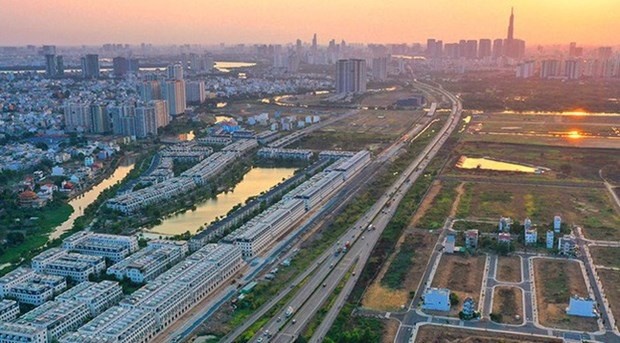Vietnamese enterprises must strive hard to tap Middle East market's potential: experts
 |
| By the end of August, there were 173 valid FDI projects of Middle Eastern enterprises in Vietnam with a value of 1.38 billion USD, accounting for 0.34 percent of the total registered FDI in Vietnam. |
Hanoi - Investment and trade cooperation between Vietnam and Middle Eastern countries have achieved many encouraging achievements. However, there is still a lot of work for Vietnamese enterprises to do to conquer this potential market besides capacity, prestige and understanding habits of consumers.
By the end of August 2021, Vietnam exported goods worth 5.22 billion USD to the Middle East and imported 5.49 billion USD worth of goods from the region, contributing 2.45 percent and 2.5 percent to the export and import turnover of the country, respectively.
Regarding investment cooperation, by the end of August, there are 173 valid foreign direct investment (FDI) projects of Middle Eastern enterprises in Vietnam with a total value of 1.38 billion USD, accounting for 0.34 percent of the total registered FDI in Vietnam.
Currently, 9 out of 15 countries in the Middle East, including all major economic partners of Vietnam in the region, have opened embassies in Hanoi.
According to economic expert Can Van Luc, the efficiency of cooperation between enterprises of the two sides is still modest, failing to match with the potential and needs of enterprises of the two countries.
The most significant difficulty of enterprises is limited information on the business environment, especially those related to legal regulations, market potential and cooperation opportunities. Differences in culture and consumption habits are also an obstacle.
In addition, Vietnamese enterprises also face difficulties in payment because the financial markets of some countries in the region have not yet developed.
Moreover, due to a lack of information about the Middle East market, to avoid risks, Vietnamese enterprises often export through international intermediary companies, resulting in an increase in goods prices and lower competitiveness.
Concurring with Luc’s opinion, Nguyen Quoc Hung, Secretary General of the Vietnam Bankers Association, said Vietnamese enterprises have to face fierce competition in terms of goods with other countries such as rice and cereals from India; tea and spices from China and India; and agricultural products from Thailand, Kuwait and India.
To promote and create favourable conditions for economic, energy and trade cooperation between Vietnam and the Middle Eastern countries in the coming time, according to Luc, businesses need to be more proactive in updating information, carefully researching the market and creatively changing their trade promotion methods to make them more effective.
It is necessary to focus on training qualified human resources with good foreign languages and understanding Middle Eastern culture, he said.
Luc also highlighted the importance of enhancing connections and cooperation among Vietnamese businesses when participating in trade exchange events in the region.
Meanwhile, Hung said that Vietnam and countries in the Middle East need to continue to improve the legal framework, mechanisms and policies to create favourable conditions for trade and investment cooperation activities of their businesses.
It is essential to strengthen high-level exchanges to deepen economic, trade, investment and health cooperation and ensure maximum benefits of Vietnamese enterprises as well as the interests of those in the Middle East, he said
What the stars mean:
★ Poor ★ ★ Promising ★★★ Good ★★★★ Very good ★★★★★ Exceptional
Related Contents
Latest News
More News
- IP alterations shape asset strategies for local investors (January 22, 2026 | 10:00)
- 14th National Party Congress: Vietnam - positive factor for peace, sustainable development (January 22, 2026 | 09:46)
- Japanese legislator confident in CPV's role in advancing Vietnam’s growth (January 22, 2026 | 09:30)
- 14th National Party Congress: France-based scholar singles out institutional reform as key breakthrough (January 21, 2026 | 09:59)
- 14th National Party Congress: Promoting OV's role in driving sustainable development (January 20, 2026 | 09:31)
- 14th National Party Congress affirms Party’s leadership role, Vietnam’s right to self-determined development (January 20, 2026 | 09:27)
- Direction ahead for low-carbon development finance in Vietnam (January 14, 2026 | 09:58)
- Vietnam opens arms wide to talent with high-tech nous (December 23, 2025 | 09:00)
- Why global standards matter in digital world (December 18, 2025 | 15:42)
- Opportunities reshaped by disciplined capital aspects (December 08, 2025 | 10:05)

 Tag:
Tag:



















 Mobile Version
Mobile Version